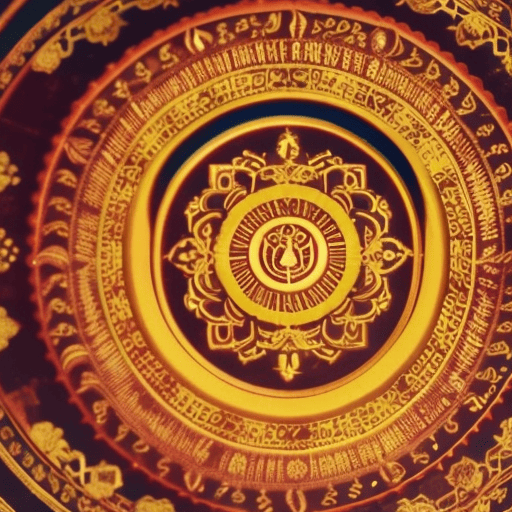Step right up, and dive into the magical world of mundane astrology! It’s not as boring as it sounds – trust us.
Welcome to historical astrology, where celestial movements meet world events. By exploring the stars’ influence on our collective journey, we understand historical trends in a new light.
Mundane astrology offers this astrological interpretation of history. It’s like having a cosmic roadmap to past and future societal changes. Intrigued yet?
Stay with us and unlock the secrets of mundane astrology! This is your chance to view history through a star-spangled lens and predict what lies ahead.
Mundane astrology, also known as political or state astrology, is a branch of astrology that focuses on the interpretation of celestial events and their influence on world affairs. It delves into how planetary alignments and transits impact historical events, societal changes, and future trends.
The scope of mundane astrology extends beyond individual horoscopes to encompass global phenomena. By analyzing planetary positions at specific times, astrologers can gain insights into significant shifts in history and predict potential outcomes.
Throughout history, mundane astrology has played a significant role in understanding major geopolitical developments. Ancient civilizations such as the Egyptians and Babylonians relied on celestial observations to guide their rulers’ decisions. The practice continued through the Middle Ages and Renaissance periods when astrologers advised monarchs and leaders.
Planetary alignments hold immense symbolic meaning in mundane astrology. For instance, the conjunction of Saturn and Jupiter is often associated with significant shifts in power structures or societal norms. Each planet’s inherent characteristics further shape interpretations – Mars representing conflict or aggression, Venus signifying diplomacy or romance.
Mundane astrology’s relevance lies in its ability to elucidate connections between cosmic patterns and human events. By examining historical case studies, we can observe how certain planetary configurations coincide with periods of revolution, economic upheaval, or cultural transformation.
Furthermore, analyzing planetary transits assists astrologers in predicting future trends. By studying upcoming alignments and their potential impact based on past correlations, one can offer valuable insights into forthcoming societal changes or geopolitical developments.
Criticisms surrounding mundane astrology primarily emerge from skeptics who dismiss its validity due to the lack of scientific evidence supporting its claims. While debates persist regarding its predictive accuracy versus coincidental correlations with historical events, proponents argue that it provides a unique perspective for understanding complex sociopolitical dynamics.
In conclusion, embracing the insights offered by mundane astrology allows us to gain a deeper understanding of historical shifts by recognizing the interplay between cosmic patterns and human affairs. By studying planetary alignments, transits, and their interpretations, we can unlock valuable insights into the past, present, and future of our world.
[{“image”:“file://step_3/image-1693844524401.png”}]
Definition and Scope of Mundane Astrology
Mundane astrology is a branch of astrology that focuses on the interpretation and prediction of events and trends on a global scale. Unlike personal astrology which deals with individual horoscopes, mundane astrology examines celestial alignments and their impact on societies, nations, and historical events.
The scope of mundane astrology encompasses various aspects such as politics, economics, social movements, natural disasters, and even technological advancements. By analyzing planetary positions, transits, and aspects at specific times, astrologers aim to gain insights into the collective consciousness and anticipate significant shifts in world affairs.
Astrological interpretations in mundane astrology involve examining the symbolism associated with each planet’s energy and how it interacts with other celestial bodies. For example, the alignment of Saturn and Pluto may indicate a period of intense transformation or upheaval in societal structures.
Through the lens of mundane astrology, historical events can be reevaluated by exploring the astrological influences present during those times. This approach allows for a deeper understanding of why certain events unfolded as they did.
Case studies within mundane astrology help illustrate its effectiveness in analyzing historical shifts. By retrospectively applying astrological principles to past events like wars or political revolutions, patterns emerge that shed light on the underlying cosmic forces at play.
Furthermore, by observing planetary transits over time periods associated with significant societal changes or turning points in history, astrologers can make predictions about future trends. However, it is important to note that these predictions are not deterministic but rather offer potential trajectories based on prevailing cosmic energies.
While mundane astrology has gained recognition for its insights into historical phenomena and its potential predictive capabilities for future trends, it also faces criticisms from skeptics who question its scientific validity. Debates surrounding this branch continue to shape discussions within both astrological communities and academia.
In conclusion, mundane astrology provides a unique perspective for understanding historical shifts through planetary alignments while offering potential insights into future trends. By embracing its principles, we can gain a deeper understanding of the complex interplay between celestial energies and the world around us.
Historical Significance of Mundane Astrology

Mundane astrology has played a significant role throughout history, influencing and shaping major events and shifts in societies. Dating back to ancient civilizations, this branch of astrology has provided insights into the broader cosmic forces at play.
Ancient civilizations such as the Babylonians and Egyptians recognized the power of celestial movements and their impact on earthly matters. They used mundane astrology to predict agricultural cycles, natural disasters, and even political outcomes. This knowledge was invaluable in ensuring survival and making informed decisions.
During the Renaissance period, mundane astrology experienced a resurgence in popularity. Astrologers like William Lilly gained recognition for accurately predicting historical events such as wars, epidemics, and economic fluctuations using planetary alignments and transits. Their insights were sought after by rulers and decision-makers looking to navigate uncertain times.
In more recent history, the world wars highlighted the relevance of mundane astrology. Astrologers analyze planetary positions to forecast geopolitical tensions and conflicts. The alignment of planets during key moments shed light on impelling factors behind global shifts.
Today, mundane astrology continues to be studied and applied by astrologers worldwide. By examining past patterns, astrologers can gain a deeper understanding of historical shifts and potentially predict future trends. However, it is important to note that there are ongoing debates regarding its validity as a predictive tool.
In conclusion, the historical significance of mundane astrology cannot be underestimated. From ancient civilizations to modern times, it has provided valuable insights into societal changes driven by cosmic influences. By understanding these patterns, we can gain a greater appreciation for the interconnectedness between celestial bodies and human affairs
[{“image”:“file://step_15/image-1693844559914.png”}]
Understanding the Basics: Planetary Alignments and their Interpretations
In mundane astrology, understanding planetary alignments is crucial to interpreting their impact on historical events. These alignments refer to the positions of planets in relation to each other and to specific points on Earth.
One important concept in interpreting planetary alignments is conjunctions, which occur when two or more planets align closely together. Conjunctions signify a blending or intensification of energies, often resulting in significant shifts or events. For example, a conjunction between Saturn and Pluto can indicate periods of intense transformation and societal restructuring.
Another key aspect is opposition, where two planets are positioned directly opposite each other in the zodiac. Oppositions represent tension or conflict between opposing forces. When Jupiter opposes Uranus, for instance, it can manifest as sudden disruptions or unexpected breakthroughs.
Additionally, square aspects highlight challenges and conflicts that need resolution. A square occurs when two planets are approximately 90 degrees apart. For instance, a square between Mars and Saturn may bring about obstacles or delays that require patience and perseverance.
Trines and sextiles are harmonious aspects that facilitate the ease and flow of energy between planets. Trines occur when planets are approximately 120 degrees apart, while sextiles happen at around 60 degrees. These aspects often signify opportunities for growth and positive developments.
Understanding these planetary alignments allows astrologers to interpret their potential effects on historical events accurately. By analyzing how these alignments interact with the astrological chart of a particular event or country, astrologers gain insights into the underlying influences shaping societal shifts throughout history.
In conclusion, mastering the interpretation of planetary alignments is essential in mundane astrology as it provides valuable insights into the dynamics behind historical events. By understanding how different planetary configurations influence societal changes, astrologers can deepen our understanding of past shifts while also offering predictions for future trends based on these celestial patterns.
The Influence of Mundane Astrology on Historical Events

Mundane astrology, a branch of astrology that focuses on the influence of celestial bodies on world events, has played a significant role in shaping our understanding of historical shifts. By examining planetary alignments and their interpretations, astrologers have been able to shed light on the circumstances surrounding major societal changes.
Throughout history, mundane astrology has provided valuable insights into the connections between planetary transits and notable events. For instance, the alignment of Saturn and Pluto in Capricorn in 2020 coincided with the COVID-19 pandemic and its far-reaching consequences. This celestial configuration highlighted themes of transformation, power struggles, and societal restructuring.
Case studies further demonstrate how mundane astrology can unveil hidden patterns within historical shifts. By analyzing specific timeframes and planetary positions, astrologers have identified correlations between celestial events and significant milestones such as revolutions, wars, or economic crises. These findings emphasize the interconnectedness between cosmic energies and human affairs.
Furthermore, by analyzing the impact of planetary transits on societal changes, mundane astrology offers a deeper understanding of historical developments. Planetary movements can act as catalysts for social transformations by influencing collective consciousness and shaping cultural paradigms. Studying these influences allows us to gain insights into the underlying forces that drive progress or instigate upheaval.
While mundane astrology has been instrumental in predicting future trends based on past patterns and planetary cycles, it is not without criticism. Some argue that attributing historical events solely to celestial configurations oversimplifies complex causes. Nonetheless, proponents highlight the value of mundane astrology in providing alternative perspectives for interpreting historical occurrences.
In conclusion, embracing the insights offered by mundane astrology enriches our comprehension of historical shifts by recognizing the influence of cosmic energies on worldly affairs. By delving into planetary alignments and their interpretations within specific timeframes, we gain a more nuanced understanding of how celestial forces shape human history.
Case Studies: Examining Historical Shifts through Mundane Astrology
Mundane astrology, a branch of astrology that focuses on the interpretation of planetary movements and their impact on world events, has provided insightful analysis of historical shifts. By examining case studies, we can gain a deeper understanding of how celestial alignments influence societal changes.
One notable example is the French Revolution. Astrologers have analyzed the planetary positions leading up to this pivotal event in history. They observed that the presence of Uranus in Aries, a sign associated with rebellion and revolution, coincided with the rise of political unrest and the overthrow of the monarchy. This case study highlights the correlation between planetary transits and significant historical occurrences.
Another case study involves the fall of the Berlin Wall. Mundane astrologers have examined the planetary alignments during the late 1980s and noted the conjunction of Saturn and Uranus in Capricorn, symbolizing the collapse of oppressive systems and the emergence of societal transformation. This analysis helps us comprehend how celestial events can shape the course of human history.
Mundane astrology also sheds light on economic shifts. For instance, the Great Depression of the 1930s is linked to the Saturn-Pluto square aspect, which denotes financial hardships and societal upheaval. By studying such cases, we can uncover valuable insights into the relationship between celestial configurations and economic fluctuations.
Through these case studies, mundane astrology showcases its ability to offer unique perspectives on historical events. By examining planetary alignments and their interpretations, we can gain a deeper comprehension of the underlying forces that drive societal changes. As we analyze the impact of planetary transits on historical shifts and predict future trends, mundane astrology continues to provide valuable insights for a more comprehensive understanding of our world.
[{“image”:“file://step_16/image-1693844612842.png”}]
Analyzing the Impact of Planetary Transits on Societal Changes

Mundane astrology offers valuable insights into the impact of planetary transits on societal changes. By analyzing the movement and alignments of celestial bodies, astrologers can gain a deeper understanding of historical shifts and their underlying causes.
Planetary transits refer to the movement of planets as they align with each other or specific points in an astrological chart. These transits have a profound influence on human behavior, collective consciousness, and societal structures. Mundane astrologers study these transits to identify patterns and correlations with significant events in history.
For example, during times of major planetary alignments such as conjunctions or oppositions, we often witness significant social, political, or economic transformations. The conjunction between Uranus and Pluto in the 1960s is a notable example. This alignment coincided with a period of intense social change and activism known as the counterculture revolution.
By examining past instances where particular planetary transits coincided with significant events, mundane astrology helps us understand how cosmic energies can shape society’s trajectory. This analysis allows for informed predictions about potential future trends based on upcoming planetary alignments.
However, it is important to note that mundane astrology has its critics. Skeptics argue that attributing societal changes solely to planetary influences oversimplifies complex historical processes. They emphasize factors such as socio-political dynamics and technological advancements instead.
Despite debates surrounding its validity, mundane astrology remains a valuable tool for gaining insights into historical shifts and predicting future trends. By studying the impact of planetary transits on societal changes, we can deepen our understanding of humanity’s collective journey through time.
In conclusion, through the analysis of planetary transits within mundane astrology, we can unravel connections between celestial movements and societal transformations throughout history. While criticisms exist regarding this approach’s simplicity, embracing these insights allows for a more nuanced comprehension of our past and potentially better predictions for the future.
The Role of Mundane Astrology in Predicting Future Trends
Mundane astrology, a branch of astrology that focuses on the study and interpretation of celestial events and their impact on society, plays a crucial role in predicting future trends. By analyzing planetary transits and alignments, mundane astrologers can forecast potential societal changes and provide valuable insights into the direction of historical shifts.
Through the observation of planetary movements, mundane astrology seeks to understand the underlying cosmic energies that influence human affairs. Planetary transits, which occur when planets move through specific zodiac signs or aspects with other planets, are key indicators used by astrologers to predict future trends.
By examining these transits and their corresponding interpretations, mundane astrologers can identify potential turning points or significant events that may shape society. For example, the alignment of Saturn with Pluto in 2020 was believed to symbolize transformative changes globally, evidenced by major political shifts and the COVID-19 pandemic.
Mundane astrology also considers long-term cycles such as Jupiter-Saturn conjunctions or eclipses to analyze broader societal trends. These cycles provide valuable context for understanding historical patterns and predicting future developments.
However, it is important to note that mundane astrology is not deterministic but rather offers probabilities based on celestial alignments. It serves as a tool for gaining insight into potential outcomes rather than providing fixed predictions.
Despite criticisms and debates surrounding its validity, mundane astrology continues to be utilized by some individuals and organizations seeking deeper understanding and foresight into future trends. Its ability to shed light on historical shifts makes it a valuable resource for those interested in exploring the connections between celestial phenomena and human affairs.
In conclusion, mundane astrology plays an essential role in predicting future trends by analyzing planetary transits and interpreting their impact on society. While it does not offer definitive predictions, it provides valuable insights into potential societal changes and helps deepen our understanding of historical shifts.
Criticisms and Debates Surrounding Mundane Astrology
Mundane astrology, despite its significant impact on understanding historical events and predicting future trends, has not been without its fair share of criticisms and debates. While many proponents argue for its validity and usefulness, skeptics question the scientific basis of this astrological practice.
One common criticism of mundane astrology is the lack of empirical evidence to support its claims. Skeptics argue that the interpretations of planetary alignments and their influence on societal changes are subjective and based on anecdotal evidence rather than rigorous scientific analysis. They believe that any correlations observed between astrological predictions and historical events could be mere coincidences.
Another debate surrounding mundane astrology revolves around the role of causality. Critics argue that attributing societal shifts solely to planetary transits oversimplifies complex social phenomena. They contend that historical events are influenced by numerous factors such as politics, economics, and cultural dynamics, making it difficult to isolate the specific impact of celestial bodies.
Furthermore, some critics claim that mundane astrology can be misused or manipulated for personal or political gain. They argue that predictions made through this practice can create false hope or fear among individuals or even sway public opinion in certain directions.
Despite these criticisms, adherents of mundane astrology maintain that it offers valuable insights into historical patterns and societal developments. They argue that while it may not conform to traditional scientific methods, it provides a unique perspective on understanding human history and potential future trajectories.
In conclusion, mundane astrology remains a subject of ongoing debates and discussions within both academic and esoteric circles. While skeptics challenge its scientific validity and causality principles, proponents advocate for its use as a complementary tool for interpreting historical shifts. Whether one chooses to embrace or dismiss mundane astrology ultimately comes down to personal beliefs and openness to exploring alternative perspectives in understanding our complex world.
Conclusion: Embracing the Insights of Mundane Astrology for a Deeper Understanding of Historical Shifts
Mundane astrology provides a powerful tool for comprehending historical shifts and societal changes. By analyzing planetary alignments and their interpretations, astrologers can gain valuable insights into the influences that shape our world.
The historical significance of mundane astrology cannot be understated. Throughout history, astrologers have utilized this practice to understand and predict significant events such as wars, revolutions, and economic fluctuations. Planetary transits play a crucial role in these analyses, as they highlight key periods of transformation and upheaval.
Case studies further demonstrate the efficacy of mundane astrology in examining historical shifts. By studying past events through an astrological lens, researchers have been able to uncover patterns and correlations that shed light on the underlying forces at play.
Moreover, mundane astrology also plays a vital role in predicting future trends. By understanding how planetary transits impact societal changes, astrologers can forecast potential outcomes and provide guidance for individuals and communities alike.
Despite its effectiveness, mundane astrology has faced criticisms and debates. Skeptics argue that it lacks scientific validity or is merely coincidental. However, proponents maintain that when approached with careful analysis and interpretation, mundane astrology offers unique perspectives that enhance our understanding of historical developments.
In conclusion, embracing the insights provided by mundane astrology allows us to delve deeper into historical shifts with a fresh perspective. By recognizing the influence of planetary alignments on societal changes, we can gain a greater appreciation for the interconnectedness between celestial movements and human affairs. Ultimately, incorporating mundane astrology into our study of history opens up new avenues for exploration and enhances our comprehension of the complex tapestry of human existence throughout time.
Welcome to MysticalDigits.com, where Numbers hold the key in Unveiling Your Destiny.
I’m Alexios, your guide to the hidden language of numbers. Let’s unlock ancient wisdom and empower your journey!
Join our community of seekers. Crack the code.
“Believe in the power of digits. Unlock your destiny.”.

